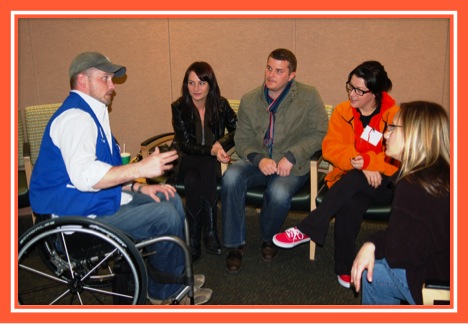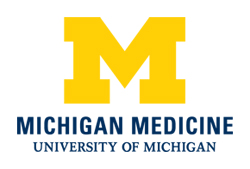
Peer Support is intentional, personalized, relationship-based, and available as needed. Peer Support offers a real-life, real-time perspective, a view only an experienced patient or family member can provide. This section of the website provides guidance and resources from a sampling of established hospital or clinic-based peer support programs across the United States and Canada, and highlights a few Exemplar Programs that partner with patients and families to design and implement evidence-based programs.
Exemplar Programs include hospital-wide, unit and diagnosis-based, as well as out-patient and community-based models and partnerships. The information in the hospital or clinic-based Exemplar profiles is sourced from program responses to a Questionnaire about the design, development, and implementation of the programs including organization/administrative structure, staffing, finance, and operations, volunteer recruitment, training, and support, service delivery model, evaluation and sustainability. The name of each program listed below is linked to a full profile of that program.
While each Exemplar Program is unique, all the programs share key success factors.

IPFCC invites other peer to peer programs—both emerging and exemplars—to respond to the list of questions for submission to IPFCC for consideration to be profiled. Please consider sharing with IPFCC other information about peer support programs, resources, and research. Please send information to institute@ipfcc.org and put Peer Support in the subject line.
Exemplar Programs in Hospitals or Clinics
- Hospital Inpatient
-
Helen DeVos Children's Hospital

Institution/Organization: Helen DeVos Children's Hospital is a pediatric hospital in Grand Rapids, Michigan and a division of Spectrum Health.
Clinical setting: Level IV, 108-bed Regional NICU
Organizational Structure: Hospital based
Delivery Model: One-to-one volunteer match offered on admission
Funding: Program supported by NICU budget
Staffing: Three part-time staff (RN, BSN, and MSW), one of whom is a former NICU parent. (32-40 combined hours). Interdisciplinary professional job-share model combines specific knowledge base and skill sets important for supervision and support of volunteers.
Reporting Structure: Volunteers report directly to social work and nurse coordinators; Coordinators report to NICU Nurse Manager.
Read more...
Family Support Network™ of Eastern North Carolina (FSN-ENC) at Vidant Health
Institution/Organization: Vidant Medical Center James and Connie Maynard Children's Hospital in Partnership with the Family Support Network of Eastern North Carolina, a non-profit support and information network for families.
Clinical setting: All units of the Women's Center and the James and Connie Maynard Children's Hospital including NICU, Special Care Nursery, Pediatric Intensive Care, Pediatrics, Pediatric Rehabilitation, Women's Center ante-partum patients, and Labor & Delivery
Organizational Structure: Hospital/Community Partnership
Service Delivery Model: One-to-one (parent-to-parent)
Funding: Hospital contract
Staffing: 40 hrs/week dedicated staff time.
Reporting Structure: Director of FSN-ENC reports to Vidant Medical Center VP of Women and Children
Number of Mentors: 50 active mentors
Read more...
Vanderbilt University
Medical Center

Institution/Organization: Vanderbilt University Medical Center—Vanderbilt University Hospital & Vanderbilt Health (Adult Enterprise Inpatient Hospital & Outpatient Clinics)
Clinical setting: Hospital Inpatient: Cardiology, ICU/Trauma and Traumatic Brain Injury, Amputee, Spinal Cord
Outpatient: Hearing & Speech (Laryngectomee) and Cancer Clinic (Hope Connection)
See also, Vanderbilt Program for LGBTI Health—Trans/Buddy Program
Organizational Structure: Department of Patient & Family Centered Engagement Volunteer Services
Delivery Model: One-to-one. In addition, Trauma Unit Peer Visitors are invited to attend weekly support groups for the Outpatient Clinic (TBI's), and monthly support groups for spinal cord, amputee, and TBI's.
Reporting Structure: A "Volunteer Coordinator" in each program supervises and assigns volunteers. Supervisors may be a Nurse Educator or Manager, Outreach Coordinator, or Program Coordinator on the unit or within the department. All coordination occurs as part of staffs "regular" job. Hope Connection is the only program where there is a dedicated staff person whose job includes coordinating the peer program.
Number of Mentors: 100 active Peer Volunteers
Read more...
Riley Hospital for Children at Indiana University Health

Institution/Organization: Riley Hospital for Children at Indiana University Health
Clinical setting: Unit Based in the GI Department, Inflammatory Bowel Disease (IBD)
Organizational Structure: The IBD parent-to-parent program is one of several unit-based parent-to-parent programs including NICU, Heart Center, and GI Department. The IBD Parent Mentoring Program is under the direction of the Coordinator of Patient- and Family-Centered Care and Patient Experience.
Delivery Model: One-to-one (parent-to-parent)
Funding: no operating or program budget
Staffing: Coordinator of Patient- and Family-Centered Care and Patient Experience
Reporting Structure: Mentors meet with IBD physician and research nurse
Number of Mentors: Three lead-mentors
Read more...
Stanford Health Care

Institution/Organization: Stanford Health Care is an academic medical center, with a designated Level 1 Trauma Center, 613 licensed beds, 49 Operating Rooms, with ambulatory visits per year at more than a half a million.
Service Delivery Model: One-to-one match
Staffing: Peer 2 Peer Program is staffed @ 0.6 FTE dedicated to the P2P and Woman to Woman programs. The current Program Coordinator has a Masters in Social Work (MSW), State of California licensure (LCSW) and a Masters in Public Health (MPH). The specific educational requirement is a MSW with LCSW preferred.
Reporting Structure: This program reports to Administrative Director of Patient and Community Engagement and to a Care Coordination Manager in the Department of Social Work and Case Management.
Read more...
University of Michigan
Health System (UMHS)

Institution/Organization: University of Michigan Health System (UMHS)—is a large academic health care system made up of Hospitals, Health Centers and Clinics throughout the state of Michigan.
UMHS PFCC Program: For a decade, UMHS has been growing their PFCC program and now includes >800 online advisors, >400 onsite advisors and 5.5 FTEs of PFCC staff. In addition, several pediatric units have hired "parents" to expand PFCC programming locally.
Peer Program Delivery Models: UMHS has18 peer mentor programs with >100 mentors who support inpatient and ambulatory care patient/family members. Peer models include: one-to-one matches (in-person/on-line); private social media group sites; unit/clinic "peer staffing"; and support groups.
Peer Mentor Infrastructure: Each Peer Mentor Program must have local level "peer mentor coordinators" (ie social workers, nurses, clinic managers) who are responsible for mentor recruitment, program specific training, day-to-day mentor management and program evaluation. Each peer mentor coordinator spends 2-10 hours per week working in this capacity. PFCC Program staff assists with interviewing, volunteer on-boarding, and PFCC orientation. Unit/department, volunteer services, and PFCC program share in the costs to manage the program. Stipends are not provided to volunteers.
Read more...
-
Providence Health Care

Institution/Organization: Providence Health Care (PHC), HIV Program—St. Paul's Hospital, John Ruedy Immunodeficiency Clinic (IDC), http://idc.providencehealthcare.org/
Clinical setting: Primary Care HIV Clinic (IDC) and Acute Care Inpatient
Organizational Structure: Collaboration with community partners, Positive Living BC. The Peer Navigation program evolved from PHC commitment to include patients in program planning and from the long-standing involvement of HIV positive people in the delivery of HIV care and support services.
Delivery Model: Paid Peer Navigators. At least one peer navigator is in the IDC (dedicated office) during day time clinic hours. Additional Peer Navigators provide outreach and co-facilitate support groups.
Funding: Contract with Positive Living with funding from the Regional Health Authority, via Ministry of Health funds programs under "treatment as prevention".
Staffing:The Peer Navigation Program Coordinator, one of the key developers of the program, provides ongoing supervision and support to navigators. Navigators are employed by Positive Living BC and report to the manager of Positive Living BC.
Reporting Structure: Peer Navigators report to the manager of Positive Living. Resource Year Started: 2010
Read more...
Trans Peer/Buddy Program
at Vanderbilt University
Medical Center

Institution/Organization: Trans Peer/Buddy Program at Vanderbilt University Medical Center, Vanderbilt Adult Inpatient and Outpatient Clinics, Vanderbilt Program for LGBTI Health
Clinical setting: Primary and Emergency Care support and patient-centered advocacy
Organizational Structure: Partnership between Trans Buddy Program, Vanderbilt Program for LGBTI Health, and Department of Patient and Family Centered Engagement Volunteer Services.
Service Delivery: One-to-one: Trans Peer/Buddy group also provides 24/7 phone support and peer volunteers will meet patients at the Vanderbilt Emergency Department for emergent care the hospital setting or go with patients to scheduled primary care appointments.
Reporting Structure: Trans Peer Program Coordinator supervises and assigns peer volunteers based on the requests that are made from clinical staff or requests directly from patient/family member. The Trans Peer/Buddy program conducts quarterly meetings/updates.
Number of Mentors: 24
Read more...
-
Family Support Network™ of Western North Carolina (FSN-WNC) at Mission Children's Hospital

Institution/Organization: Family Support Network™ of Western North Carolina (FSN-WNC) at Mission Children's Hospital
Clinical setting: Mission Children's Outpatient Center
Organizational Structure: Hospital Sponsored. This program is part of Mission Children's "Bigger Aim" to create an exceptional experience for the patient, teamwork and population health.
Type of Support: One-to-one; Education and Support Groups
Funding: 90% Hospital funded; 10% Grant funded
Staffing: Three full-time staff called Family Support and Outreach Coordinators
Reporting Structure: A newly developed role of "Patient and Family Centered Support Manager" supervises FSN Coordinator and all report to Women and Children Services.
Number of Mentors: 70+
Read more...
University of Michigan
Health System (UMHS)

Institution/Organization: University of Michigan Health System (UMHS)—is a large academic health care system made up of Hospitals, Health Centers and Clinics throughout the state of Michigan.
UMHS PFCC Program: For a decade, UMHS has been growing their PFCC program and now includes >800 online advisors, >400 onsite advisors and 5.5 FTEs of PFCC staff. In addition, several pediatric units have hired "parents" to expand PFCC programming locally.
Peer Program Delivery Models: UMHS has18 peer mentor programs with >100 mentors who support inpatient and ambulatory care patient/family members. Peer models include: one-to-one matches (in-person/on-line); private social media group sites; unit/clinic "peer staffing"; and support groups.
Peer Mentor Infrastructure: Each Peer Mentor Program must have local level "peer mentor coordinators" (ie social workers, nurses, clinic managers) who are responsible for mentor recruitment, program specific training, day-to-day mentor management and program evaluation. Each peer mentor coordinator spends 2-10 hours per week working in this capacity. PFCC Program staff assists with interviewing, volunteer on-boarding, and PFCC orientation. Unit/department, volunteer services, and PFCC program share in the costs to manage the program. Stipends are not provided to volunteers.
Read more...
Learn more...
Success Factors
Learn about the Success Factors that are essential to sustaining peer support programs.
Delivery Models and Organizational Structures
Learn more about various delivery models and organizational structures, as well as community-based peer support programs.
Research
Links to selected research organizations and publications.
Resources
Links to available resources, including training and marketing materials, and other guidance.













